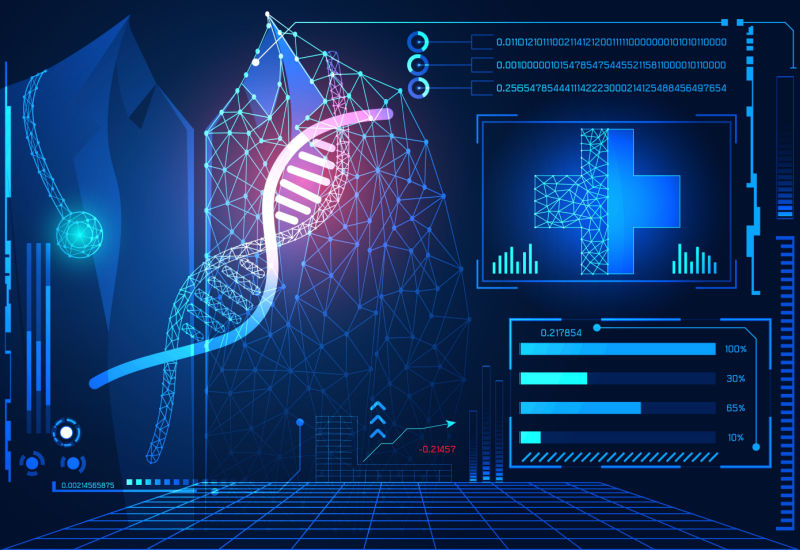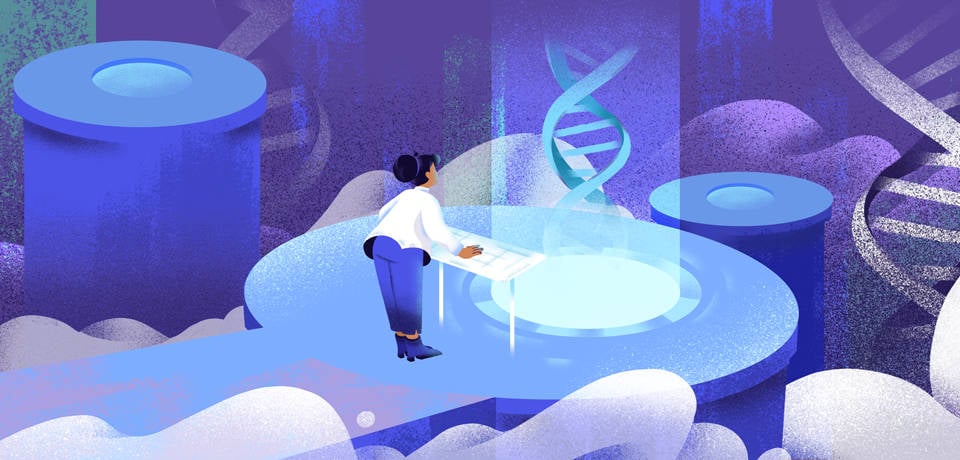Newsletter Signup - Under Article / In Page
"*" indicates required fields
Despite the onset of the genomics era, rare disease diagnosis remains a challenge. Nostos Genomics’ co-founder, Rocío Acuña Hidalgo, and chief operating officer, Ansgar Lange, shed light on how artificial intelligence (AI) could fill in the gaps.
It is estimated that 300 million people worldwide are affected by rare diseases and around 80% of these conditions have a genetic component. Collectively, these diseases are not rare, yet they remain the health orphans of the medical system, lacking attention and being poorly managed due to their complex clinical nature.
Innovations in sequencing technology such as the completion of the human genome sequence and the integration of next generation sequencing (NGS) in clinical settings have paved the way for a genomics area where clinicians can now link specific genetic variants to rare diseases, providing molecular-based diagnoses. This has been pivotal for the diagnosis of genetic disorders and worldwide access to genetic testing.
Despite this progress, diagnosing rare genetic diseases often ends in inconclusive results.
Current challenges in diagnosing rare genetic diseases
Paradoxically, the strength and weakness of modern genome-based sequencing technologies is the vast amount of information provided.
Interpretation of a gene variant is largely still a manual process, consisting of variant filtering alongside the evidence-based review of candidate disease-causing variants. Trying to identify one disease-causing variant buried deep in millions of benign ones is incredibly difficult and labor-intensive, requiring highly trained genomic specialists to comb through multiple lines of evidence, scientific literature and disease databases.
However, the rarity of individual diseases entails that such evidence of a variant being pathogenic may never have been reported in a disease database. This non-standardized process of assessing the pathogenicity of a variant leads to discordance across laboratories and variant interpretation bottlenecks.
Patients with rare genetic diseases are subjected to years of health complications and emotional distress, waiting for a conclusive diagnosis and effective treatments. Solutions are needed to both reduce this diagnostic journey and streamline genomic interpretation.
AI: a modern tool to diagnose rare genetic diseases
Innovative machine learning algorithms have been developed that can comb through genetic datasets and support the identification of disease-causing variants within minutes, eradicating the need for labor-intensive manual interpretation.
These AI systems have been trained using molecular, experimental, population-level and clinical data sources interpreted by human genomic experts. The system can then learn this method of interpretation, predict candidate variants in undiagnosed genetic disorders and better inform healthcare professionals.
By quickly identifying the most promising candidate variants for interpretation, AI-driven tools are revolutionary, supporting experts in making fast, accurate and novel diagnoses to improve patient outcomes.
These tools are simple to integrate and place genetic laboratories in a unique position to scale their operations.
At present, large-scale sequencing of populations produces a wealth of information that overwhelms personnel resources in genomic laboratories. Governments are proposing and initiating big projects towards genetic testing of populations, in some cases without a clear path on how this data will be analyzed.
By reducing the complexity and time of variant interpretation, AI systems provide an extra pair of hands, reducing the workforce needed to match large-scale sequencing operations while overcoming the interpretation bottleneck presented.

Hurdles for AI to overcome in rare disease diagnosis
AI can only be as good as the data you feed it. Limitations arise in the form of non-coding pathogenic variants, ancestry-specific bias in genomic datasets and patient data protection issues. Non-coding variants are regions of the DNA sequence that do not directly code for proteins, making it more difficult to understand how mutations in these variants affect cellular function.
It is no longer the genome in isolation we need to understand, but the integration of multiomics data. AI is beginning to acknowledge this by integrating experimentally derived data on non-coding DNA variants into their algorithmic training. This, in combination with variant data obtained from disease databases, provides a more extensive training platform for AI algorithms to learn and improve predictions.
The goal of these AI-driven tools is to support and enhance the expertise of clinicians, not to replace them.
Regulatory and ethical issues can stem from the transparency of underlying algorithms themselves and the privacy of patient sequencing and clinical data. For the clinical adoption of AI systems, it is essential that the trust of populations is won when it comes to participation in genetic testing and data sharing, especially in rare genetic diseases where sharing the discovery of a novel disease-causing variant is paramount.
Technology adopting so-called “white-box” AI models can help, as these models have a core value of being understandable and interpretable, allowing for human-based explanations of predictions and increased understanding of how patient data is utilized.
Governments or regulatory bodies will need to ensure clear rules for this and the proper implementation of AI-aware policies on how a patient’s genetic information is used.
The future of AI in genetic test interpretation
With continuous advances in the accuracy and affordability of high-throughput sequencing and AI, diagnosing a rare genetic disorder is becoming more economical and accessible for global healthcare markets to invest in.
As the wealth of genomic datasets grows, access to this data will be vital in providing further training datasets for AI systems to excel. AI will diagnose better, faster and with less bias to fill the diagnostic gap for undiagnosed patients.
The ‘future of AI’ is already materializing, with AI-driven interpretation correctly predicting disease-causing variants that previously had unknown significance in relation to disease. Employing the same AI-driven tools across different laboratories and datasets will support more consistent variant classifications and improve data-sharing infrastructures to accelerate the progress of variant identification in rare genetic diseases.
To embed AI-driven diagnosis into existing clinical structures, clinicians need to understand the underlying models to allow for explanations of predictions. Transparency should be maintained with patients, with clear and continuous outreach efforts to also educate them on the technology being used. For patients to fully benefit from AI-driven genetic testing, a standardized way of assessing reimbursement of genetic tests needs to be developed.
The vast volume of new genetic testing methodologies coming onto the market makes it difficult for insurance companies to keep up and evaluate which genetic test should be covered. For AI to progress in a clinical setting, clear guidelines need to be defined for when AI-driven genetic sequencing is most appropriate for a patient.
The future of AI is bright, and has the potential to create a revolutionary shift in how patients suffering from rare genetic disorders are diagnosed and treated. Its potential will be bolstered by the successful implementation of increasing multiomics data, continued algorithmic transparency and progressive government guidelines.
Nostos Genomics’ CTO and co-founder Rocío Acuña Hidalgo, originally trained medical doctor (MD), obtained her degree and doctorate in human genetics and is now developing approaches combining genomic expertise, machine learning and high-throughput biological experiments to lead the team on the technical side.
Nostos Genomics’ COO Ansgar Lange is a commercial health-tech leader with a PhD in health economics. Prior to joining Nostos in early 2021, he served as COO of a UK startup and helped it grow from 8 to 2,000 employees. At Nostos he oversees partnerships and drives business development.
The power of AI in antibody discovery






